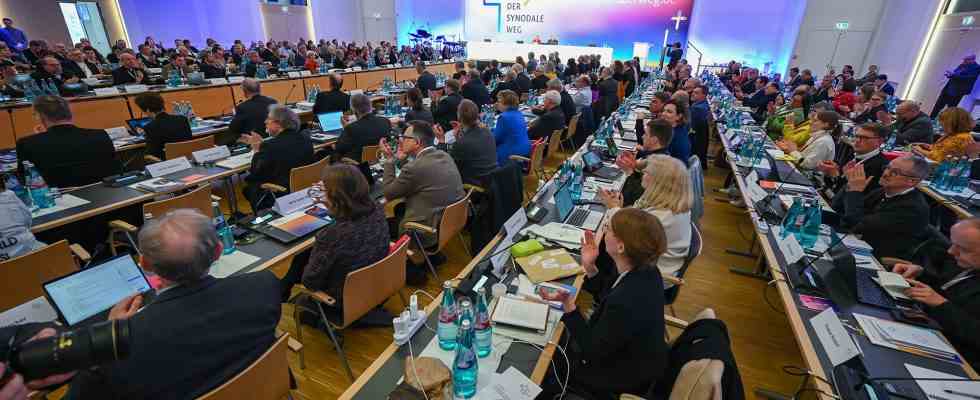analysis
Status: 03/11/2023 7:30 p.m
After three and a half years of the synodal path in the Catholic Church, far-reaching reform decisions have been made. The laypeople had to make a number of compromises. Many had hoped for more from the reform project.
On Friday afternoon there was a rare moment of relief and relief during the Synodal Path. The hide-and-seek game in the blessings for same-sex couples in the Catholic Church should come to an end. The synodal assembly decides to officially celebrate blessings for homosexual couples. Seen from the outside, the long overdue end of discrimination.
From an inner-Catholic point of view, however, it was a reform step that was difficult to achieve. The Vatican had previously expressly banned it. But it was clear to everyone that this decision would have a signal effect on the willingness to reform in the Catholic Church and ultimately on the success of the Frankfurt reform project as a whole. Another scandal like a year ago, when the bishops refused to approve a realignment of Catholic sexual morality, would have destroyed the synodal path.
No votes and abstentions
However, there has apparently been no real change of heart among the reform-skeptical bishops. The vote for the blessing celebrations was only possible because bishops expressed their concerns about this step not with a “No” vote, but with one abstention. If “no” votes and abstentions were added together, the text would have failed and the necessary two-thirds majority of the bishops would not have been achieved at the blessing ceremonies for homosexuals.
One can interpret this approach of abstaining rather than saying “no” as a concession on the part of the bishops. But if they did, then it didn’t happen out of conviction, but rather out of tactical considerations.
accommodating laypeople
In the end, it was the laypeople in particular who proved accommodating. They again made the sobering realization that about a third of the bishops do not want to jump on the reform bandwagon in the long term. Rather, after the Roman reform bans of the past few weeks and months, there have been even more. In order to push through at least a few reform beacons together, the majority of laypeople who are decidedly willing to reform have accepted compromises to the point of pain.
In order to make the women’s preaching possible, more far-reaching reform wishes had to be given up. For example, that women get permission to baptize, to assist at marriages or to hear confessions. In order to get a vote in favor of Rome opening the office of deacon to women as well, a wording that contained a “diaconal leadership office” had to be deleted.
The desire, so often expressed in the synod hall, for equal rights for women in all offices of the church – including priestly ordination – was watered down beyond recognition in the end. Corresponding arguments for the ordination of women, which the synodal assembly had passed six months ago, are now only to be “introduced into the universal church discourse”.
Tense atmosphere among participants
It was said several times that the bishops would vote “No” if the assembly did not adopt appropriate mitigations. That went against the honor of the synodal leaders and caused wounds. Especially since the far-reaching change requests had only been submitted at the last minute. The atmosphere was therefore “tense to the breaking point” in parts, as Bishop Bätzing, the chairman of the bishops’ conference, said. And he self-critically stated that the bishops apparently had not learned to “play the synod game” until the Fifth Plenary Assembly.
Many synods have invested hundreds of hours in the preparation of reform texts over the past three years. They now experienced some bishops who did not show up during the preparations, at the hearings and at the end still demanded changes that could have been discussed long ago.
In this respect, old fronts have broken open at the finale of the synodal path. When it comes down to it, some bishops play the old game and draw the power card, attendees were heard saying. With all understanding for the dependence of the bishops on Rome and their integration into the universal church: Again the question arose as to whom the officials actually have the primary loyalty – the pope or the people in this country?
Reform decisions with consequences
At the end of the three-year synodal path, reform decisions were made that have consequences. Above all, the change in church labor law: homosexuals can no longer be dismissed because of their love, they receive the church blessing. After all, women should be allowed to show their faces in the pulpit. That’s a lot less than many would have liked.
The hard realization of the synodal path is that refusal to reform is not only on the agenda in Rome and that changes still take far too long in this church. At the same time, the Catholic Church in Germany can no longer retreat behind the synodal path. The course has been set with the establishment of a Synodal Committee. Bishops and lay people will remain on the same path together, so the cultural change in the coexistence of ministers and lay people that began in Frankfurt am Main will have another field of practice.

